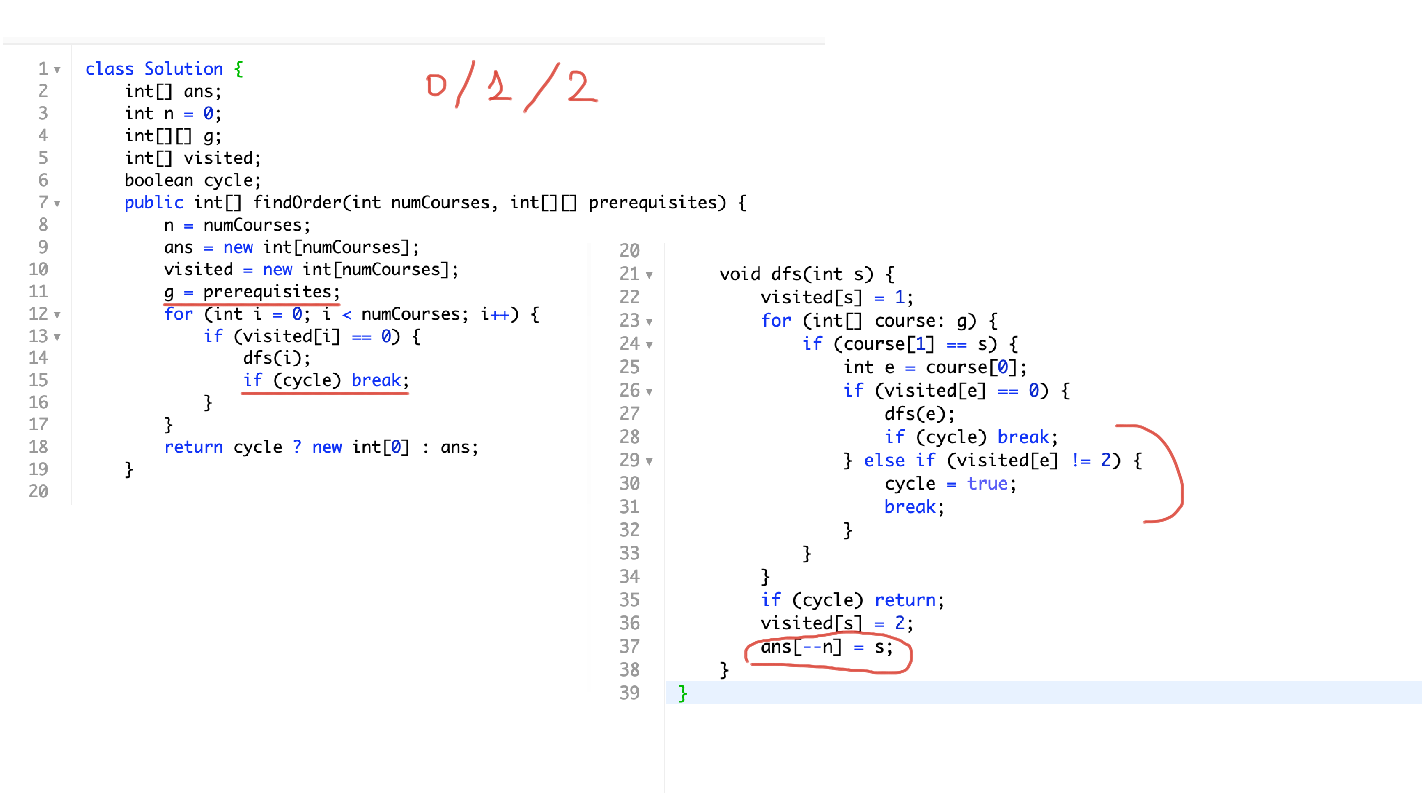210. Course Schedule II
There are a total of numCourses courses you have to take, labeled from 0 to numCourses - 1. You are given an array prerequisites where prerequisites[i] = [ai, bi] indicates that you must take course bi first if you want to take course ai.
For example, the pair [0, 1], indicates that to take course 0 you have to first take course 1.
Return true if you can finish all courses. Otherwise, return false.
1
2
3
4
5
6
| Example 1:
Input: numCourses = 2, prerequisites = [[1,0]]
Output: true
Explanation: There are a total of 2 courses to take.
To take course 1 you should have finished course 0. So it is possible.
|
1
2
3
4
5
6
| Example 2:
Input: numCourses = 2, prerequisites = [[1,0],[0,1]]
Output: false
Explanation: There are a total of 2 courses to take.
To take course 1 you should have finished course 0, and to take course 0 you should also have finished course 1. So it is impossible.
|
Constraints:
- 1 <= numCourses <= 105
- 0 <= prerequisites.length <= 5000
- prerequisites[i].length == 2
- 0 <= ai, bi < numCourses
- All the pairs prerequisites[i] are unique.
Jamboard#

Solution#
1
2
3
4
5
6
7
8
9
10
11
12
13
14
15
16
17
18
19
20
21
22
23
24
25
26
27
28
29
30
31
32
33
34
35
36
37
38
39
| class Solution {
int[] ans;
int n = 0;
int[][] g;
int[] visited;
boolean cycle;
public int[] findOrder(int numCourses, int[][] prerequisites) {
n = numCourses;
ans = new int[numCourses];
visited = new int[numCourses];
g = prerequisites;
for (int i = 0; i < numCourses; i++) {
if (visited[i] == 0) {
dfs(i);
if (cycle) break;
}
}
return cycle ? new int[0] : ans;
}
void dfs(int s) {
visited[s] = 1;
for (int[] course: g) {
if (course[1] == s) {
int e = course[0];
if (visited[e] == 0) {
dfs(e);
if (cycle) break;
} else if (visited[e] != 2) {
cycle = true;
break;
}
}
}
if (cycle) return;
visited[s] = 2;
ans[--n] = s;
}
}
|
Solution 2021-11-23#
1
2
3
4
5
6
7
8
9
10
11
12
13
14
15
16
17
18
19
20
21
22
23
24
25
26
27
28
29
30
31
32
33
34
35
36
37
38
39
40
41
42
43
44
45
46
47
| class Solution {
int[] res;
int size;
public int[] findOrder(int numCourses, int[][] prerequisites) {
int n = numCourses;
Map<Integer, List<Integer>> g = buildGraph(n, prerequisites);
res = new int[n];
size = n - 1;
int[] visited = new int[n];
for (int i = 0; i < n; i++) {
if (visited[i] == 0) {
boolean hasCycle = dfs(i, visited, g, res);
if (hasCycle) {
return new int[0];
}
}
}
return res;
}
boolean dfs(int index, int[] visited, Map<Integer, List<Integer>> g, int[] res) {
visited[index] = 1;
for (int nei: g.get(index)) {
if (visited[nei] == 0) {
if (dfs(nei, visited, g, res)) {
return true;
}
} else if (visited[nei] == 1){
return true;
}
}
visited[index] = 2;
res[size--] = index;
return false;
}
Map<Integer, List<Integer>> buildGraph(int n, int[][] prerequisites) {
Map<Integer, List<Integer>> g = new HashMap<>();
for (int i = 0; i < n; i++) {
g.put(i, new ArrayList<>());
}
for (int[] prer: prerequisites) {
g.get(prer[1]).add(prer[0]);
}
return g;
}
}
|
